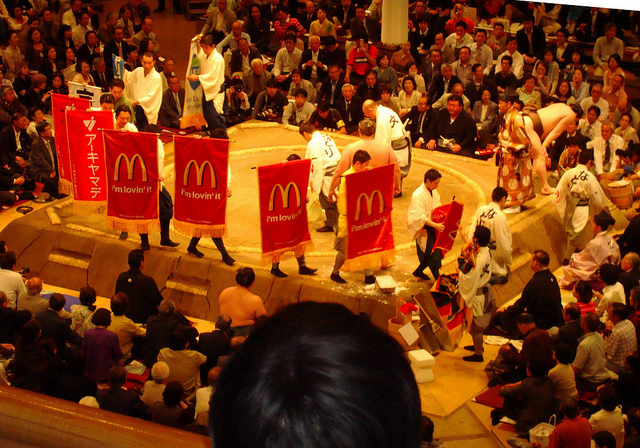McDonald's in Japan is only selling small servings of French fries to deal with a potato shortage caused by a port strike. The move is causing consternation and surprise among the chain's dwindling consumer base, and the potato shortage is just another example of the fast food chain's steady decline in Japan.
A port strike on the West Coast of the United States that is showing no signs of ending is the reason why McDonald's has resorted to rationing French fries.
【今日から】マックポテトがSサイズのみに http://t.co/VJE1PRtofJ #マック #マクドナルド #ポテトS pic.twitter.com/M9eSq0vN8X
— モデルプレス (@modelpress) December 17, 2014
Starting from today you can only buy a small French fries at McDonalds #McD's #McDonald's #small fries
All set meals will for the time being only be served with the smaller size of French fries, with a small discount thrown in to make up for the smaller size.
Japanese reactions to the restriction on French fry consumption can be followed using the #ポテトS (#small Fries) hashtag:
今日からマックポテトSサイズのみ。これは追い風だと思う!少なくとも、私にはMサイズは多すぎ。セット50円引きなのも嬉しいね! http://t.co/OENKrPmkaD #ポテトS #マクドナルド #マックポテト
— ぽんあか(EOS6D+レンズ) (@ponaka_san) December 17, 2014
Starting today you can only buy a small fries at McDonald's. This is actually awesome because the regular-size fries McDonald's normally sells is too large, and now we get a 50-yen (US$0.50) discount with every meal!
Others were left uninspired by the change to the menu:
#マクドナルド なんて最近食べてないけど、ポテトのSサイズなんてショボくて食いたくないわ。#ポテトS pic.twitter.com/P8Cmm54ztb
— ゲリメル (@garymelson) December 17, 2014
I have not eaten at #McDonald's recently, and the sheer uninspiring dullness of their small fries is not going to bring me back.
The Japan French fry debacle is a continuation of the McDonald's restaurant chain's troubles in Japan, which date back just over a year to August 2013, when Sarah Casanova was appointed president of McDonald’s Holdings Japan, the company that operates 3,280 outlets across the country.
Originally from Canada, Casanova is a 22-year McDonald's veteran, who once served as executive director of McDonald’s Japan and marketing head from 2004 to 2009. She replaced Eikoh Harada, himself a former Apple executive who worked to aggressively build up McDonald's in Japan for nearly a decade, winning accolades as a business guru in the process.
However, in the year before his departure, McDonald's sales in Japan slumped thanks to a combination of strong competition from convenience stores and an ageing population.
Casanova's year at the helm of McDonald's in Japan has seen a steady stream of missteps, including a tainted-food crisis that severely dented consumer confidence in the company, notably because, from a Japanese sensibility, Casanova failed to properly apologize to customers. McDonald's Japan has also been criticized for overcharging customers.
Since the food scandal, customers have not returned to McDonald's, a contributing factor to the company's first-ever operating loss in Japan. According to a statement made at the end of October 2014, McDonald's Japan's operating loss is expected to reach 9.4 billion yen (US$85.5 million) in the year through December 2014, reversing an 11.5 billion yen ($US100 million) operating profit of the previous year, when Harada was running the company.
Franchise owners are upset, not only because of the sudden reversal in profits, but also because McDonald's, under Casanova's leadership, has implemented confusing and unmanageable business processes with franchises that have led to the losses in the first place.
McDonald's has tried to placate franchisees by temporarily reducing royalty payments. But with operating losses still forecast for 2015, for franchisees there is no end in sight to slumping sales and the expectation they will still have to pay their franchise royalties no matter what the market conditions.
A quote from a franchisee, as reported in the Nikkei Shimbun, has gone viral:
「フランチャイズオーナーの私たちには売り上げ目標を出させておきながら、会社が赤字の業績予想を出すのはどういうことか」
How can you be asking us franchisees to pay you royalties when McDonald's is forecasting to be in the red in 2015?
A Japanese business blogger observed:
しかし、フランチャイズオーナーらは、
「いずれは支払わなければならない」、
「実際はただ借金を負っただけ」と言う……「客足を回復する起爆剤にはならない…」と
見るFCオーナーの存在も。全店舗の7割近くをFC店が占め、
販売の中心は完全にFC店に移っている現状では、
消費者のみならず、FCのオーナーたちの信頼も
取り戻す必要があるのではないでしょうか。
The thing is, franchise owners are being asked to agree to future royalty payments while accepting all of the liability…
…Franchisees can see there is no way to instantly recover all of the customers that have departed over the past few years. Franchises account for 70% of McDonald's stores in Japan, McDonald's sales in Japan depend on franchise owners. The people who head McDonald's in Japan not only have to win over consumers, they also have to win over the franchisees as well.
The Nikkei article points out that for franchisees, the disappointment is caused by more than just falling profits and the threat of onerous royalty payments:
今回、FCオーナーを取材する中で感じたのは、オーナーたちが日本マクドナルドに対して強い愛着を持ち、誇りを持って働いているという点だ。
なぜか。実はオーナーの中には元社員から独立した人が多く、日本マクドナルドの創業者である藤田田・元社長の「現場主義」に共感し、「マクドナルドに育てられた」という思いを強く抱いている。そのため、ここ数年の現場の実情と乖離した本社の施策が出てくるたびに、疑問を抱きながらも従わざるを得ないという苦渋を噛みしめていたようだ。
When researching this story and speaking with franchisees, one feeling was very apparent: franchise owners feel a strong bond of affection for McDonald's Japan, and take pride in their work with the company.
One reason for this is that many McDonald's franchisees started out as McDonald's employees themselves, and went on to own and operate their own restaurants. They wholeheartedly embraced McDonald's Japan's original core philosophy of “management from the bottom up,” believing that McDonald's made them who they are as entrepreneurs.
However with every incident in recent years that points out how much the folks at head office in McDonald's Japan have become estranged from the day-to-day realities of running a McDonald's restaurant, franchisees have had to uncomplainingly swallow their bitterness.
Thanks to an aging population, more savvy competitors and plain mismanagement, McDonald's, once a beacon of American culture in Japan, faces an uncertain future in that country.
【悲報】マクドナルド中央林間店、翌年1/4の18時に閉店 30年の歴史に幕 pic.twitter.com/iOIMtMHYW7
— うみうし小川 (@39r5) December 6, 2014
McDonald's Chuo Rinkan store is set to close on April 1, 2014 after 30 years at the same location.








1 comment